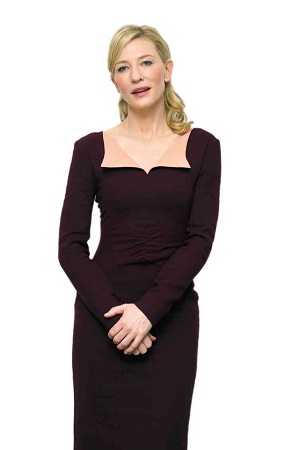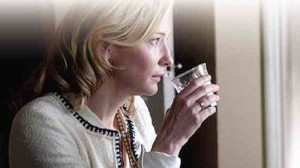(First of two parts)
LOS ANGELES—Cate Blanchett is getting the best reviews of her career—some are virtual raves—for Woody Allen’s “Blue Jasmine.” We’re sure Cate is thrilled and grateful but, in a recent interview, the actress summed up her attitude toward work in general: “I’m eternally dissatisfied. Maybe that’s why I keep working.”
We should all feel fortunate if Cate keeps working and giving us memorable performances. The Oscar- and Golden Globe-winning actress, in the title role in Woody’s film, a contemporary Blanche DuBois, a fallen, vodka-drinking socialite who tries to reconnect with her sister (Sally Hawkins), is being hailed this early as a contender in the coming awards season.
Joe Morgenstern, Wall Street Journal’s Pulitzer Prize-winning film critic, wrote of Cate’s performance: “To state the obvious about Woody Allen’s ‘Blue Jasmine’ before getting into the mysterious, Cate Blanchett tops anything she’s done in the past with her portrait of a fallen woman who’s a hoot, a horror, a heartbreaker and a wonder.”
Justin Chang, Variety’s senior film critic, raved: “It doesn’t hurt that this serious-minded but ruefully funny work is centered [on] a mesmerizing performance by Cate Blanchett as a neurotic Allen heroine for the ages, a desperate New York socialite … Blanchett’s performance is so dominant in terms of screen time and emotional impact that the film succeeds as not only a virtuoso ensemble piece, but also an unflinchingly intimate study of the title character.”
Brief chats
Typical of Woody’s notably brief chats with the actors when he casts them, Cate’s talks with the revered filmmaker were short. She relates in that husky voice: “I live in Australia so my first two meetings with Woody were by phone.” Calling herself a “drooling fan” of Woody’s, Cate admitted that she had given up all hope of working with him. And then she got the call.
“The conversation went for about two and a half minutes; he told me he had a script and would I read it. Of course, I said yes. Then he said, ‘Call when you’ve read it.’ So I read it straightaway. The second one ran for about 45 seconds. He said, ‘That’s great. You want to do it. I’ll see you in San Francisco.’ Then I saw him at the camera tests, and of course I saw him every day of the shooting.”
Cate, blue eyes twinkling, added, “I heard that Woody was monosyllabic on the set but I actually found him really funny, warm and accessible. You often had to ask questions. If he didn’t find the question particularly interesting, he’d go back to his BlackBerry.”
Laughing now, Cate continued: “He did give me direction. He said, ‘That’s awful’ or ‘That’s good.’ We had a great dialogue. You hear a lot, understandably, of screenwriters saying they’re the most expendable people on the set because actors change the dialogue. You often get a page with rewrites—and there are two or three writers on a script. But when you work with Woody Allen, 97 percent of his direction is in the script. His word choices are so particular and he has such a particular rhythm to his writing that you have to rise to that, you don’t pull it down to your own rhythm.”

“WHEN you work with Woody Allen, 97 percent of his direction is in the script.” Photo: MAGNUS SUNDHOLM FOR THE HFPA
Bewilderment
Cate volunteered that she and her cast mates were exhilarated that they were in a Woody Allen movie. “We were all in the same place of bewilderment because this is the guy who did ‘Interiors’ and ‘Bananas.’ And when you hear that Louis C.K., Andrew Dice Clay, Peter Sarsgaard, Bobby Canavale, Alec Baldwin and Sally Hawkins, who are all theater animals [are in the cast], you think, which way is this going to fall? And the process of going from take to take and day to day is one of trying to find the tone. The gift that Woody has is that he’s able to make us laugh at the most painful things and find the most serious things utterly absurd.”
While critics and moviegoers bring up the Blanche DuBois comparison to her Jasmine, Cate pointed out that the similarity was purely coincidental. “I had played Blanche (in “A Streetcar Named Desire”),” she said. “Liv Ullmann directed me, Joel Edgerton and some wonderful actors in a production in our first year at the Sydney Theatre Company which we took to Washington and New York. I thought maybe Woody had seen that play and that’s why he was interested in working with me.” With a chuckle, she added, “I began talking about it in our two and a half minute phone conversation and … he’d never heard of it.
“There are parallels to ‘Streetcar …’ but the way the characters interact and the payoff are quite different. It’s a very contemporary creation but there’s a long history in American drama, if you think about Mary Cavan Tyrone in ‘Long Day’s Journey Into Night’ and all the Tennessee Williams heroines—of women who walk the fine line between brutality, poetry and reality—not to draw on that or keep that alive would have been silly. But in the end, Woody’s writing is entirely different rhythmically, tonally to Tennessee Williams’. I thought about all those Upper East Side women and the financial scandals as much as I thought about Blanche DuBois.”
Jasmine character
She said further of the character that may earn her another Oscar nod: “The thing about Jasmine is that she’s already had a breakdown. I spoke to Woody about how you see a lot of people in the streets who are seemingly well put together but are babbling. I said, ‘Why doesn’t Jasmine have a shower at the end? So even though she’s walking down the street in a Chanel jacket, there’s something off.’ When I did see the film, I thought, gosh, that’s a mistake but I didn’t want to wear any makeup in the last scene. I wanted to have her hair wet so there was something off. I hazard a guess that she’s still out there because obviously, even though their hearts are in the right place, there’s an enormous love between the sisters. They’re not particularly good for each other.
“Yeah, it’s not in a happy place because she’s without any support structure. We’ve all had tough times in our lives but if you’re financially secure, you’ve got a good partner or a secure social circle, you’ve got a safety net. Then you can move through those difficult times but all of that is gone so she’s a woman without a safety net. There’s a lot of women out there like that.”
(Conclusion tomorrow)
(Email the columnist at rvnepales_5585
@yahoo.com. Follow him at twitter.com/
nepalesruben.)


